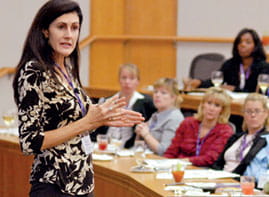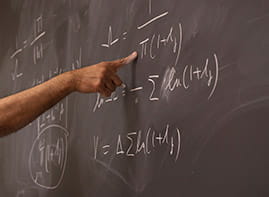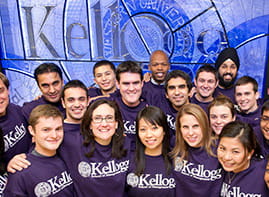Contest pits students against real-world challenge for experiential learning; MMM Program key to victory
3/11/2008 - Eight Kellogg School students reigned victorious in the recent 2008 War Game National Championship, defeating teams from Harvard Business School, MIT Sloan School of Management and the Chicago Graduate School of Business.
Now in its fourth year, the War Game National Championship is sponsored by Fuld & Co., a global leader in competitive intelligence. This is the first year that Kellogg has participated in the elite, invitation-only contest, which has previously been featured in media outlets such as the
Economist,
BusinessWeek and CNET.
“This was an incredibly rewarding experience and I was thrilled that Kellogg took part in the competition,” said Alvin Leung ’09, a member of the winning team. “Our participation is a perfect example of how the Kellogg culture of collaboration plays out through real-world, experiential learning exercises.”
The case competition consisted of a fast-paced “war game” format in which each of the participant teams assumed the identity of one of four selected companies — Google, AT&T, Intel and Vulcan Ventures — and was responsible for devising a strategy to ensure its future success. Students had little time — about 90 minutes total — to develop and adjust their strategy during the competition.
The 2008 competition was hosted at the American Academy of Arts and Sciences in Cambridge, Mass., the site where Alexander Graham Bell first demonstrated the telephone. This year’s theme, “The Battle for the Wireless Internet,” considered how the four selected companies could develop a competitive strategy to capture the most value from the emerging wireless Internet industry. Kellogg students were charged with developing a strategy for Intel, the advanced computing products giant. Specifically, students were asked to promote a wireless technology called WiMax.
“Our team’s insight was realizing that Intel was not interested in the outcome of the 700MHz spectrum auction per se,” said team member Daraius Dubash ’09. “Rather, Intel wanted to ensure that handset manufactures would use Intel products as the primary microprocessor in mobile handsets.”
Dubash noted that he and his colleagues believed that Intel “was betting that consumers would demand applications and experiences on mobile handsets that mirrored those on existing laptop and desktop computers.” The team argued that Intel was the only company that could supply such technology to ensure customer satisfaction.
The Kellogg team was able to leverage its members’ varied backgrounds and areas of expertise to triumph in this competition. Exceptionally diverse, the team was composed of students touting experience in a variety of functions, including finance, product management, telecommunications, entrepreneurship and engineering.
In addition to Dubash and Leung, Pavan Singh, Ramya Singh, Bruno Carriel, Karthik Raman, Sumanth Gargi and Hiroshi Ogino (all ’09) added their talents to bring about the Kellogg victory.
“My experience with the competition reinforced Justice Learned Hand’s observation that ‘right conclusions are more likely to be gathered out of a multitude of tongues, than through any kind of authoritative selection,’” said Dubash.
The students were able to reach out to faculty from the Kellogg Management and Strategy Department in advance of the competition. Among those consulted were the John L. and Helen Kellogg Professor of Management and Strategy Thomas Hubbard; Associate Professor of Management and Strategy Michael Mazzeo, and Associate Professor of Management and Strategy Scott Stern to secure feedback on the team’s initial ideas. The students also relied upon many of the concepts learned in the classroom, particularly in their business strategy course, which helped the team devise their hypothetical strategies.
In addition, the students credited their Management and Organizations courses at Kellogg with helping them optimize their team’s strength by dividing tasks effectively and avoiding groupthink. At the same time, the students found that the collaborative nature of their Kellogg School experience played an important part in helping the team cohere while letting them tap their diverse talents in the service of a collective goal.
In the end, the Kellogg team’s unmatched creativity helped to propel it forward.
“The teams were evaluated not only on how they performed on the stage but also how their members interacted with each other during the brainstorming period,” said Pavan Singh, a student in the Kellogg dual-degree
MMM Program. “Seeing the fluid leadership dynamics where the Kellogg students were not afraid to question and push each other for the team’s betterment, the judges were rooting for us even before we went to the podium.”






